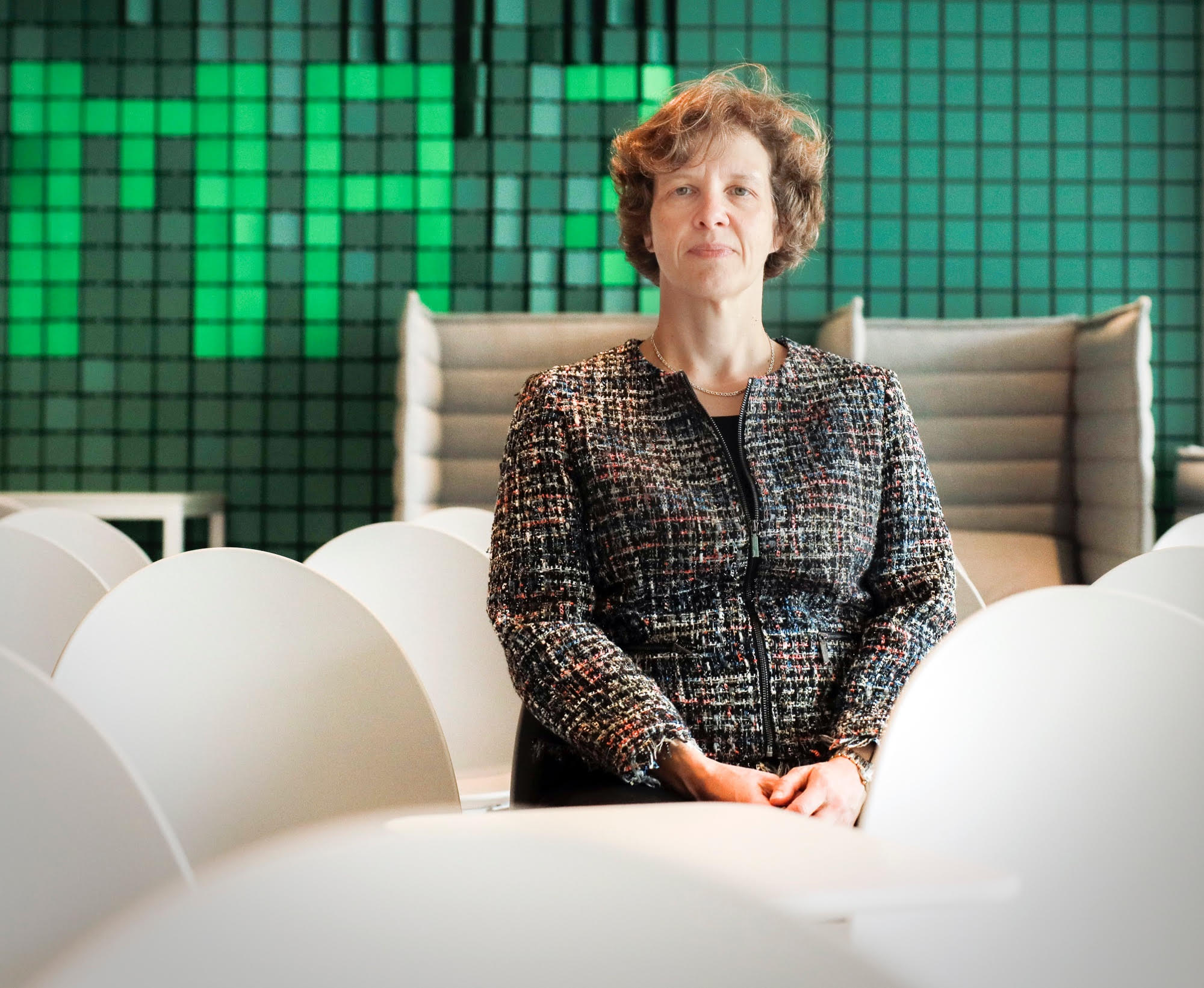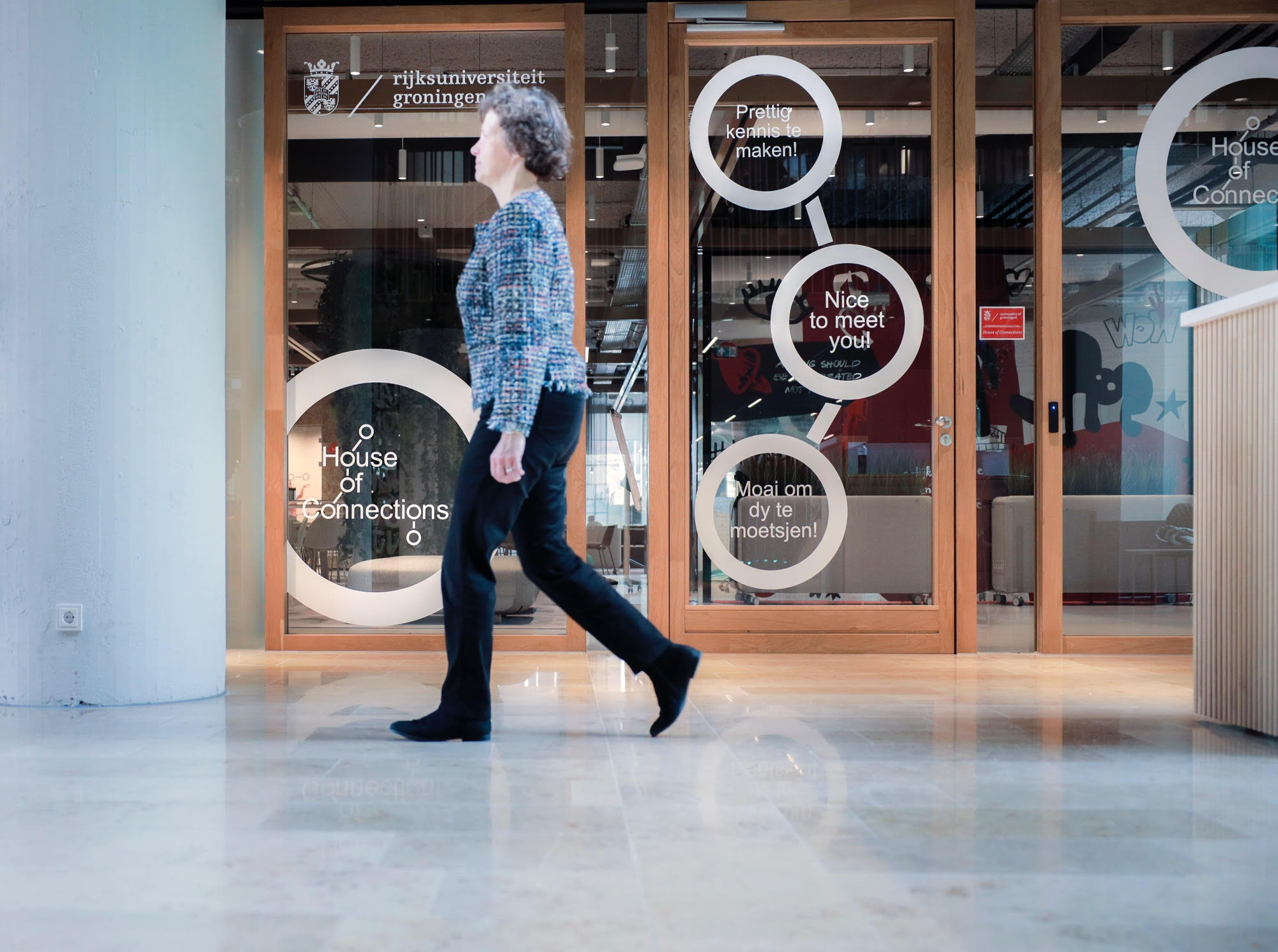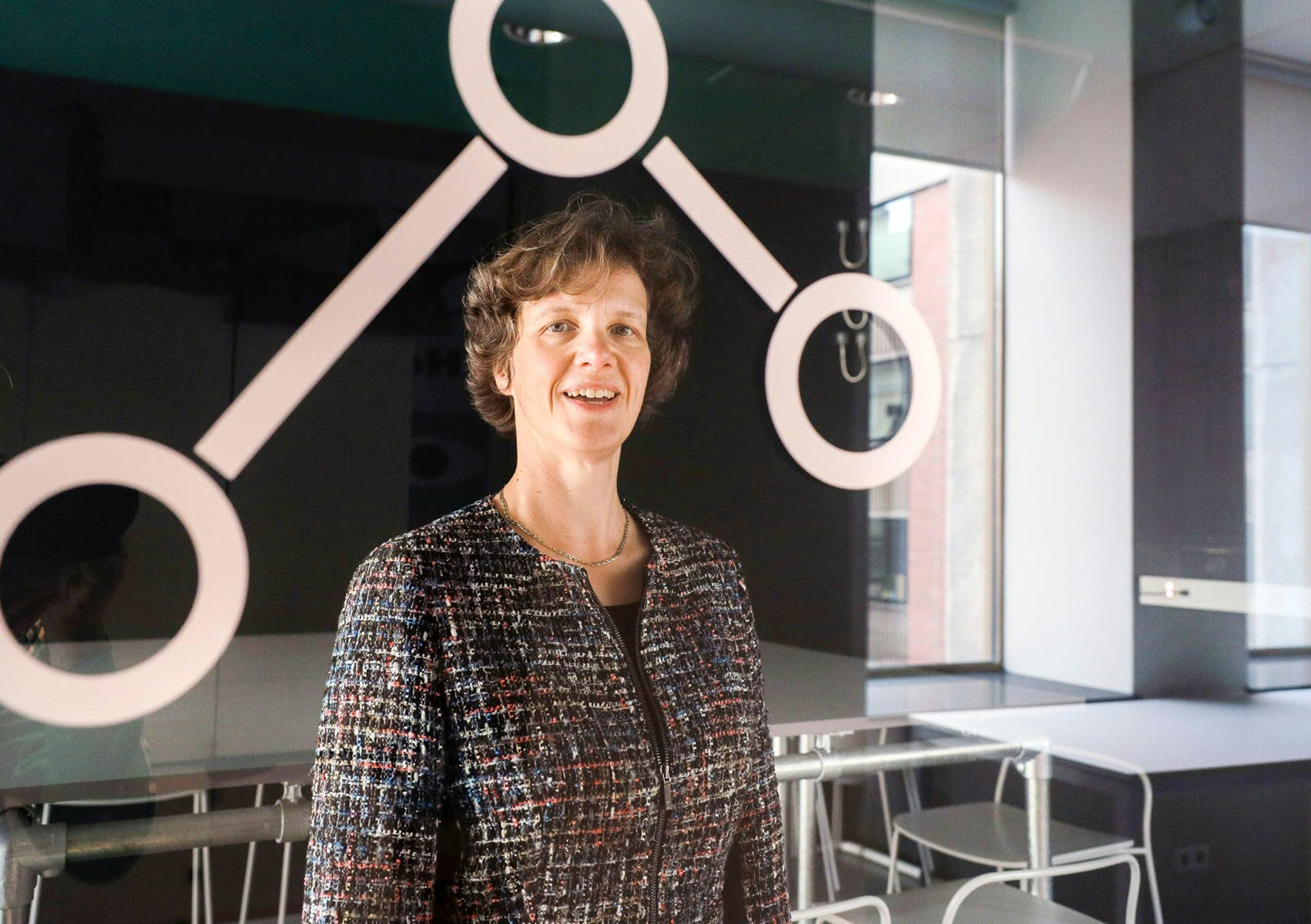Co-creatie voor maatschappelijke uitdagingen
Samenwerking en interdisciplinariteit, het zijn twee thema’s die al jaren centraal staan in het werk van Iris Vis. Onlangs werd ze benoemd tot Captain of Science bij de Topsector Logistiek. Een positie waarover ze meer vertelt op een passende plek: het nieuwe House of Connections van de RUG, waar samenwerking centraal staat. Hoe is Vis op deze positie terecht gekomen? En wat zijn haar plannen voor de toekomst?
Tekst: Britt Corporaal / Foto’s: Henk Veenstra
Prof. dr. Iris Vis is opgeleid als wiskundige. Sinds 2011 is zij werkzaam als hoogleraar Industrial Engineering aan de Faculteit Economie en Bedrijfskunde van de Rijksuniversiteit Groningen (RUG). Een belangrijke drijfveer in haar werk bestaat uit het bijdragen aan het oplossen van praktische vraagstukken gerelateerd aan maatschappelijke uitdagingen. “Het samenwerken en het kijken hoe je met elkaar innovatie kunt versnellen om maatschappelijke uitdagingen op te lossen, dat is wat mij drijft,” stelt Vis. Vis werkt daarbij nauw samen met onderzoekers uit andere disciplines en partners uit de praktijk.

Physical Internet en Onderwijslogistiek
Door samenwerking met partners uit de praktijk kan via co-creatie waardevolle kennis worden ontwikkeld in onderzoeksprojecten. Een voorbeeld daarvan is te vinden in het project Towards Virtual Ports in a Physical Internet, waarbij de RUG samenwerkte met de TU Delft, Havenbedrijf Rotterdam en Groningen Seaports. In havens speelt logistiek een zeer belangrijke rol. Gemiddeld genomen heeft elk bedrijf zijn eigen middelen, voert het zelfstandig de eigen activiteiten uit en worden routes voor vracht ruim van tevoren vastgelegd. Kan dit niet anders? “Het physical internet is gelanceerd vanuit de vraag of we kunnen groeien naar volledig open en verbonden logistieke netwerken waarin concepten van de deeleconomie centraal staan om zo de distributie van goederen te verduurzamen.” De opzet hiervan doet denken aan het reizen van passagiers in het openbaar vervoer. De route van goederen wordt ter plekke bepaald. Soms zullen ze in groepen reizen, maar soms is het handiger om op te splitsen. Soms kunnen ze in één keer doorreizen, maar soms is het juist praktisch om ze een nacht door te laten brengen in een gedeeld magazijn. In dit onderzoeksproject stond de rol van havens in het physical internet centraal.
Ook werkt Vis aan het project Onderwijslogistiek voor Gepersonaliseerd Leren. Dit doet zij in samenwerking met onder andere het Zo.Leer.Ik!-netwerk, een netwerk van scholen uit het voortgezet onderwijs die de overstap maken naar gepersonaliseerd leren. Hierbij wordt het onderwijs afgestemd op de vragen van de leerling. Om dit te kunnen organiseren zijn nieuwe logistieke concepten nodig: “Wanneer je activiteiten plant op basis van de leervragen van leerlingen, betekent dat ook dat het lesrooster niet continu vast zal staan.” Momenteel is Vis met collega's specifieke tools aan het ontwikkelen die de scholen kunnen gebruiken om gepersonaliseerd leren te organiseren. Zo is te zien dat logistiek een belangrijke functie heeft op plekken waar je het misschien niet direct verwacht.

Noord-Nederland als proeftuin
Wat is dan de connectie tussen de regio Noord-Nederland en logistiek? Noord-Nederland is een dynamische regio met veel verschillende gebieden. Er zijn steden, er is ruraal gebied en er zijn eilanden. Deze gebieden hebben allemaal hun eigen vraagstukken. Zo strijden de steden met congestie, terwijl de rurale gebieden hun mobiliteit goed moeten organiseren om de regio toegankelijk te houden. Dat betekent dat je kan onderzoeken of specifieke concepten toepasbaar zijn in al die gebieden of slechts in één ervan. Niet alleen op het gebied van mobiliteit is er veel innovatie in Noord-Nederland, maar ook op thema's als circulariteit en energietransitie. Ook voor die maatschappelijke uitdagingen is logistiek een belangrijke enabler. Deze veelzijdigheid maakt Noord-Nederland als regio zeer geschikt voor logistiek onderzoek: “Het is de ideale proeftuin. Met de oprichting van Hive.mobility als netwerkorganisatie werken we hier met veel partijen aan samen.”
“Eén van de mooie dingen vind ik het vertrouwen dat andere onderzoekers mij gaven om mij mee te nemen in hun bezigheden."
Industry Relations
Vis houdt zich al langer bezig met samenwerking tussen kennisinstituten en partners uit de praktijk. Als Dean of Industry Relations was zij met haar team namens het College van Bestuur verantwoordelijk voor het bouwen aan de strategie en implementatie van de universitaire samenwerking met externe partijen. “In die rol heb ik een integrale aanpak ontwikkeld voor het opstarten en ondersteunen van initiatieven voor maatschappelijke impact. Daarbij hebben we ons gericht op het leggen van nieuwe contacten met externe partijen, op de interdisciplinaire samenwerking tussen onderzoekers en docenten, op de gezamenlijke vorming van een visie, bijvoorbeeld in innovatieagenda's en het bouwen van eco-systemen. Met het nieuwe strategische plan "Making Connections" heeft de RUG deze maatschappelijke betrokkenheid een centrale plaats gegeven. De werkzaamheden van Industry Relations zijn nu structureel ingebed in de organisatie. Zo zijn de vier schools voor Wetenschap en Samenleving en het cluster Research & Impact opgericht. Er is zelfs een fysieke locatie opgericht waar samenwerking centraal staat: het House of Connections.

Topsector Logistiek
Nu gaat Vis alle kennis en vaardigheden die ze heeft opgedaan als Dean en als onderzoeker toepassen in haar nieuwe functie als Captain of Science bij de Topsector Logistiek: “Eén van de mooie dingen vind ik het vertrouwen dat andere onderzoekers mij als Dean gaven om mij mee te nemen in hun bezigheden en om mij de gelegenheid te geven om daar ambassadeur van te worden en daarover te spreken. Daardoor ben ik heel rijk geworden in de zin dat ik zo veel verschillende disciplines heb mogen leren kennen. Dat neem ik mee in al mijn werkzaamheden.” Deze kennis en vaardigheden komen goed van pas bij de Topsector Logistiek. Eind dit jaar eindigt het huidige uitvoeringsprogramma. Momenteel wordt er dan ook hard gewerkt aan het samenstellen van nieuwe hoofdlijnen en thema’s waar de Topsector zich de komende jaren voor zal inzetten. Wat wil de Topsector gaan doen en welke kennis is daarvoor nodig? Als voorbeeld noemt Vis veerkrachtigheid: hoe zorg je ervoor dat er veerkrachtig gereageerd kan worden op situaties zoals stijgende gasprijzen, personeelstekorten of opkomst van nieuwe technologie, bijvoorbeeld op het gebied van digitalisering? Om dit soort vraagstukken te formuleren voert Vis gesprekken met onderzoekers uit allerlei vakgebieden. Als Captain of Science vertegenwoordigt zij de wetenschappers bij de samenstelling van het nieuwe uitvoeringsprogramma: “Tegelijkertijd is het ook een belangrijke rol om te zorgen dat mensen weten van de Topsector Logistiek en om kennis met elkaar af te stemmen en cross-overs te zoeken met andere sectoren. Ik heb er wel een beeld bij, maar er zijn heel veel beelden en gezamenlijk vormen die een nieuwe visie.”
Wat is Topsector Logistiek?
Nederland heeft tien topsectoren, waarvan de Topsector Logistiek er één is. Dit zijn netwerkorganisaties waar de overheid, wetenschappers en ondernemers hun krachten bundelen op thema’s die belangrijk zijn voor Nederland. Zo kunnen topsectoren de economie met innovaties versterken. In de Topsector Logistiek ligt de focus op innovaties voor een concurrerende, veilige en emissieloze logistiek. Het houdt zich bezig met projecten op zowel regionale als landelijke schaal.
Meer informatie
Meer nieuws
-
10 februari 2026
‘Regeneratie begint waar moed en verbeeldingskracht samenkomen’
-
09 december 2025
Zijn robots de oplossing?
